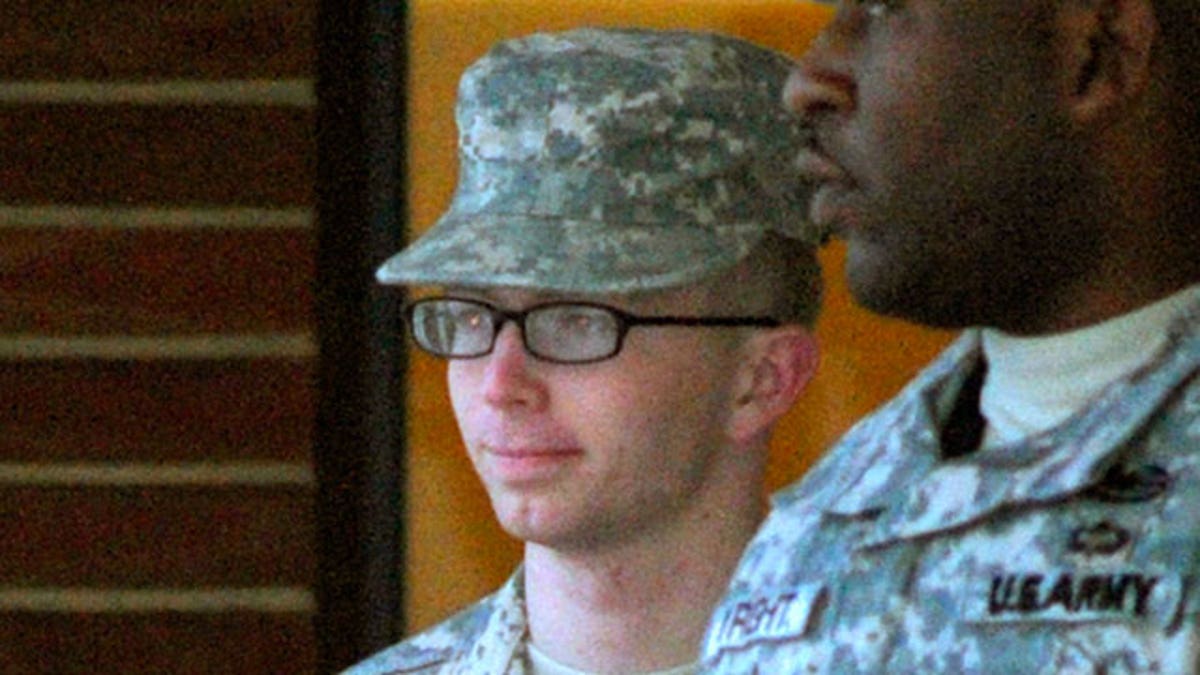
Dec. 17, 2011: Army Pfc. Bradley Manning, right, is escorted into a courthouse in Fort Meade, Md.
FOR MEADE, Maryland – A military hearing for the Army private charged with spilling a mountain of secrets to WikiLeaks focused Sunday on why Pfc. Bradley Manning remained entrusted with highly sensitive information after showing hostile behavior to those around him.
A supervisor who might have shed light on that question refused to testify, invoking his right against self-incrimination.
On the third day of the hearing to determine whether Manning will be court-martialed on 22 charges, including aiding the enemy, his defense sought to build on its case that his supervisors in the 2nd Brigade Combat Team should have seen enough red flags to suspend or revoke his access to secret information months before the leaks.
Capt. Casey Fulton, an Army intelligence officer, testified Sunday it was impossible to supervise analysts such as Manning constantly. "You have to trust that they'll safeguard the material the way that they've been taught," she said.
The defense has emphasized what it regards as a failure by Manning's closest supervisor, Sgt. 1st Class Paul Adkins, to suspend the intelligence security clearance after at least two fits of rage by the private during which he overturned furniture. Adkins refused to testify Sunday when called to do so for the government.
Other testimony revealed that Manning, serving in Iraq in 2009 and 2010, was sometimes angry and distant with others from his unit. The defense has said that Manning, who is gay, was bullied by fellow soldiers. Manning's defense team says he told Adkins he suffered from gender-identity disorder -- the belief that he was born the wrong sex.
Manning is accused of leaking a wealth of secret information, including hundreds of thousands of battlefield reports and State Department cables, contrary to the Espionage Act and the law against aiding the enemy.
Disclosures surfaced on the anti-secrecy website WikiLeaks in a breach that rattled U.S. foreign relations and, according to the government, imperiled valuable military and diplomatic sources. Defense attorneys argue the leaked material did little or no damage to U.S. interests.
Fulton provided details of a confrontation that finally got Manning banned from the workplace. She said Spc. Jirhleah Showman grew angry after she was summoned from her bed to work, and saw Manning there, apparently playing a video game.
Fulton said she heard Manning tell Showman to calm down. Fulton testified that she heard terse words exchanged, followed by shuffling sounds, and then saw Manning pinning Showman to the floor.
"She said he had struck her and she had a welt on her face," Fulton said.
Another government witness, Sgt. Chad Madaras, testified that Manning was sometimes sullen and unresponsive, especially toward Adkins.
"He would sit down at his work station and kind of ignore everyone," Madaras said under questioning by civilian defense attorney David Coombs.
Madaras said Manning "kind of separated himself from others in the unit." He said he didn't know if Manning was picked on by fellow soldiers.
In late afternoon, the presiding officer ordered the hearing closed to the news media for a discussion about testimony by a coming witness that could include classified information. It was the first time since the hearing began Friday that Lt. Col. Paul Almanza closed the courtroom.
The hearing is at Fort Meade outside Washington and could run several more days. The Army says it may take several more weeks for the commander of the Military District of Washington to decide whether Manning will be court-martialed. Maj. Gen. Michael Linnington may choose other courses, including administrative punishment or dismissal of some or all counts. He also could add more charges based on evidence produced at the hearing.
Manning, a 24-year-old native of Crescent, Oklahoma, could face life in prison if convicted.
In camouflaged fatigues and dark rimmed-glasses, Manning sat mostly erect for the third straight day, appearing calm, listening intently to the witnesses and occasionally writing on paper in front of him. He didn't speak at all Sunday except for the few occasions he leaned over to consult with Coombs.
Among the material Manning is accused of leaking is a military video of a 2007 American helicopter attack in Iraq that killed 11 men, including a Reuters news photographer and his driver.
Fulton testified that sometime before WikiLeaks released a video of attack in April 2010, she saw a similar clip on a work station computer in Baghdad. She said Manning later showed her that the WikiLeaks clip and the one she had seen were the same. Manning is suspected of leaking the video.
She testified that Manning had a "top secret" security clearance, enabling him to view a wide range of classified material. His job was to synthesize intelligence from those sources.
The case has spawned an international support network of people who believe the U.S. government has gone too far in seeking to punish Manning.








































